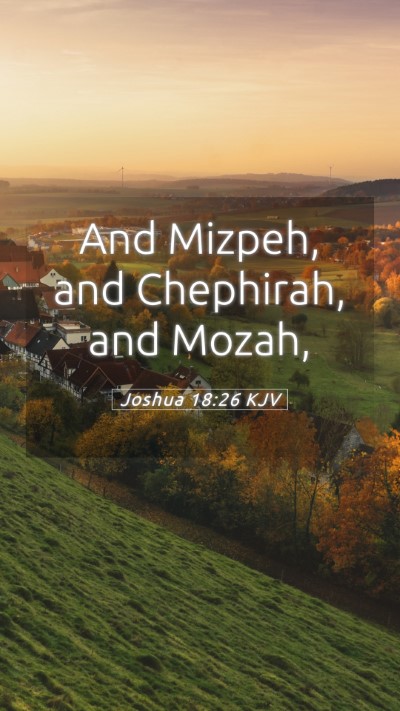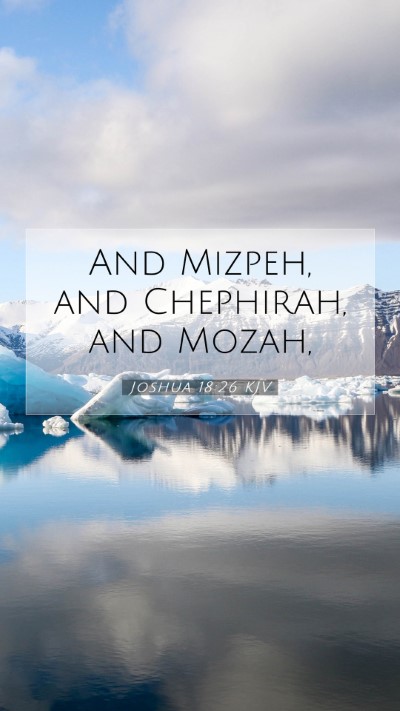Bible Verse Commentary: Joshua 18:26
Overview
Joshua 18:26 states: "And Enoch, and the city which is called Enoch after the name of Enoch, which is in the land of the Jebusites." This verse refers to a specific location linked to the allotment of land to the tribe of Benjamin. The verse enriches our understanding of the historical and geographical context of Israel during the time of conquest and settlement.
Bible Verse Interpretations
- Matthew Henry Commentary: Henry emphasizes the significance of the locations mentioned in the allotment of land and how they demonstrate God’s faithfulness in fulfilling His promise to Israel. This specific town, though minor, highlights the thoroughness of God’s providence.
- Albert Barnes Commentary: Barnes points out the importance of Enoch as a strategic location for the tribe of Benjamin. He notes that the naming after Enoch warrants reflection on the heritage and legacy of the people of Israel.
- Adam Clarke Commentary: Clarke elaborates on the Jebusites' presence in the land, indicating the continuing presence of certain Canaanite tribes that posed challenges for the Israelites as they sought to establish themselves in the Promised Land. The mention of the city also serves to remind them of their identity and the struggles faced.
Understanding Scripture
The mention of Enoch and the city named after him reflects not only a geographical detail but also underscores the significance of biblical names and places. Enoch's name carries its own deep meaning, often associated with initiation into the spiritual life and walking closely with God, as seen in the lineage of Enoch in Genesis.
Scripture Analysis
- This verse illustrates the allocation of land among the tribes, a theme present throughout the Book of Joshua, emphasizing equitable distribution as part of God’s plan.
- It invites readers to reflect on the continuous struggle for settlement in a land filled with challenges, correlating with broader biblical principles such as perseverance and faithfulness.
- The naming of the city after Enoch suggests a continuity of cultural and religious history that is integral to Israel’s narrative.
Historical Context
Joshua's distribution of the land occurs in the context of post-exodus Israel. The Jebusites still inhabit Jerusalem, indicating that there were ongoing conflicts and challenges in settling the promised territory. Understanding the context of these allotments provides insight into the military and spiritual struggles faced by the Israelites.
Application of the Verse
For modern-day believers, Joshua 18:26 offers a lesson on recognizing one’s heritage and the importance of understanding where you come from. Just as the tribe of Benjamin had a history and identity, individuals today can reflect on their spiritual lineage and the faith of their ancestors.
Bible Cross References
- Joshua 15:63 - Discusses the challenges faced by the tribe of Judah in overcoming the Jebusites.
- Judges 1:8 - Chronicles further conquests and challenges in the land.
- Genesis 5:24 - Relates to the character of Enoch, who walked with God and was taken by Him.
Conclusion
Joshua 18:26 serves as a reminder of the historical, cultural, and spiritual dynamics at play during Israel's settlement in the Promised Land. Engaging deeply with this verse enhances our understanding of Scripture and draws us to consider the narratives that God weaves throughout Biblical history, encouraging personal and communal reflections for contemporary believers.
Keywords and Search Intent
This commentary is tailored for those seeking Bible verse meanings and Bible verse interpretations, providing insights into historical context and practical applications. Whether in Bible study groups, online Bible study, or personal reflection, it aims to enhance Bible study insights and understanding of Scripture.


